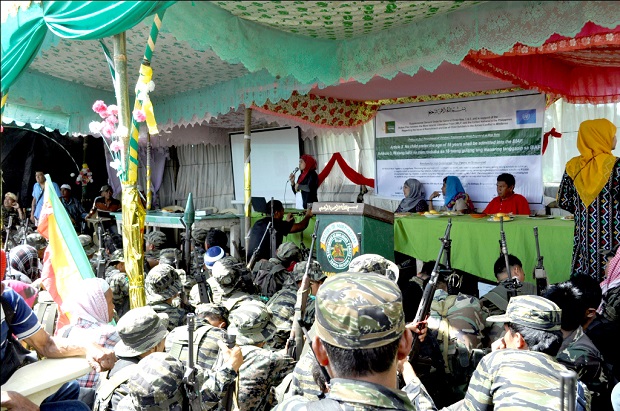Unicef briefs Moro leaders on use of children in armed conflict

Moro Islamic Liberation Front (MILF) Central Committee First Vice Chairman Ghadzali Jaafar and UNICEF Philippines Representative Lotta Sylwander exchange commitments on the progress of the UN-MILF Action Plan on the non-recruitment of children in armed conflict – the MILF Supplemental General Order stipulating the MILF’s policy on non-recruitment of children and sanctions for non-compliance; and a booklet of the Six Grave Violations Against Children during Armed Conflict, which was translated and re-printed by UNICEF for MILF troops.
In the Philippines, it is estimated that around 30,000 to 50,000 children were displaced by armed conflict ever year for the past years, of which the majority were in the Southern Philippines. The UN-MILF Action plan is a key component in ensuring that children in situations of armed conflict are protected.

Child Protection Officer Norayn Makakena of the Bangsamoro Development Agency, a UNICEF partner, conducts an orientation session at the 104th Base Command, Datu Odin Sinsuat, Maguindanao. To date, more than 4,000 BIAF elements have attended these trainings. An orientation session comprises four modules covering the following topics: Children in armed conflict; Legal framework on child protection; Monitoring and reporting mechanism in the Philippines; and UN-MILF Action Plan implementation. UNICEF PHILIPPINES
Originally signed in 2009, the Action Plan commits the MILF to concrete, time-bound activities pertaining to the prevention of recruitment and use of children as combatants or in supporting roles, the separation of any children under 18 from the command structure, unimpeded access for UN verification, and awareness raising on child rights and child protection for its military rank and file, as well as for MILF communities.
“Unicef recognizes armed conflict as a grievous violation on child rights. Children are affected by armed violence in different ways—they can be recruited as child soldiers, killed, injured and be deprived of access to basic services, including education and healthcare. Children living in conflict areas in the Philippines are among the most vulnerable, and together with its partners, Unicef is working for all of their rights to be realized and protected,” Unicef Philippines Representative Lotta Sylwander said. Orientations are currently being carried out across all 31 MILF Base Commands and 7 Front Commands in Mindanao for Bangsamoro Islamic Armed Forces (BIAF) commanders and troops. So far, 4,151 BIAF elements from 26 Base Commands and 4 Fronts have received these trainings. At the end of these sessions, MILF Front and Base Commanders publicly commit to ensure that no children are associated with their respective commands, and that if there are cases, these children will be separated from the command structure. The orientations focus on setting out the roles and responsibilities of MILF military leadership and rank and file when it comes to preventing and addressing the recruitment and use of children, as well as explaining what the sanctions are if they do not comply. The orientations are also used to raise awareness on child protection, including the definition of a child under International Law, grave violations against children, as well as legal frameworks on child protection. “Unicef commends the MILF for its commitment to address this issue and for the steady progress being made in the implementation of the Action Plan. The UN, including Unicef, will continue to support the MILF in the Plan’s implementation and in ensuring the protection of all children affected by armed conflict in Mindanao,” Sylwander added. Unicef also congratulated the Philippine government and the MILF for the progress made on the peace process. The Comprehensive Agreement for the Bangsamoro (CAB) signed in March 2014 has brought about a historic opportunity for long-lasting peace and development in Mindanao. Unicef said that it hoped that the best interest of all children and women are adequately reflected in the new Bangsamoro Basic Law. Unicef remains committed to supporting the transition process working with both parties and other key stakeholders in Mindanao to ensure it is successful, inclusive and supports the rights of all children.|
|